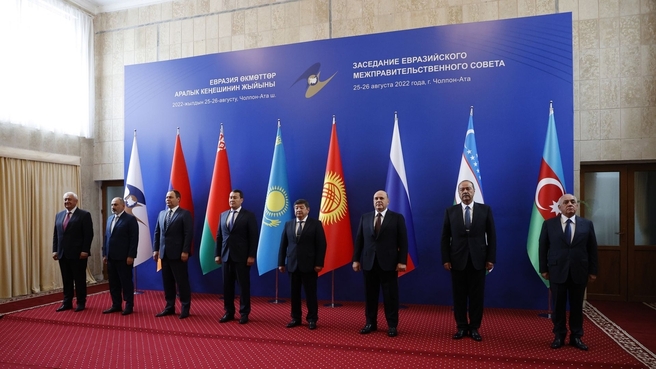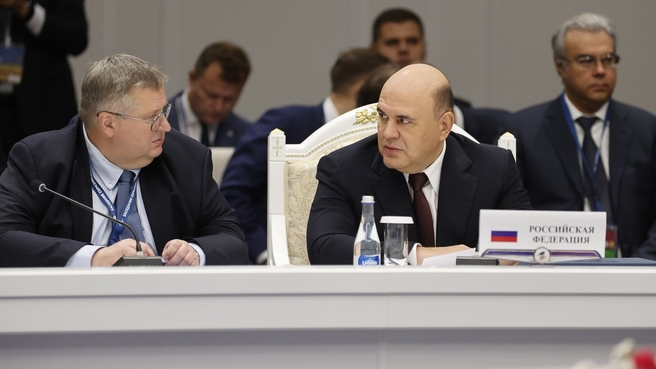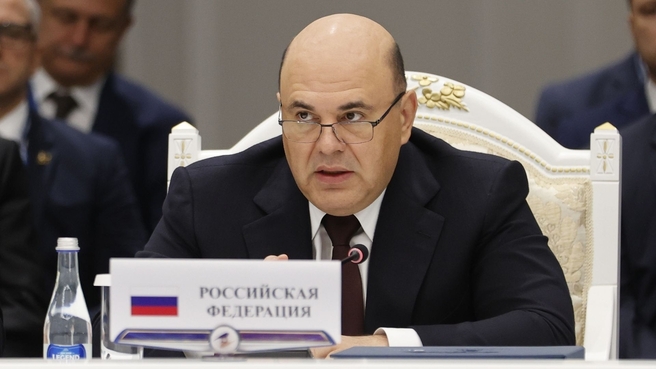The participants discussed topical matters related to achieving deeper integration within the EAEU, including efforts to create a shared natural gas market, industrial cooperation financing, promoting integration-oriented transport projects, and regulating the alcohol market.
Mikhail Mishustin’s remarks at the meeting
Delegation heads taking part in an expanded meeting of the Eurasian Intergovernmental Council:
Prime Minister of the Republic of Armenia Nikol Pashinyan;
Prime Minister of the Republic of Belarus Roman Golovchenko;
Prime Minister of the Republic of Kazakhstan Alikhan Smailov;
Chairman of the Cabinet of Ministers, Chief of Staff of the Presidential Executive Office of the Kyrgyz Republic and Chair of the Eurasian Intergovernmental Council Akylbek Japarov;
Prime Minister of the Russian Federation Mikhail Mishustin;
Prime Minister of the Republic of Cuba Manuel Marrero Cruz (via video link-up);
Prime Minister of the Republic of Uzbekistan Abdulla Aripov;
Prime Minister of the Republic of Azerbaijan Ali Hidayat oglu Asadov;
Chairman of the Board of the Eurasian Economic Commission Mikhail Myasnikovich.
Mikhail Mishustin’s remarks at the meeting:
Mr Japarov, colleagues.
I would like to join those who have already thanked our colleagues in Kyrgyzstan for their traditionally warm welcome and for the wonderful arrangements at this event.
Let me also convey my special welcome to Prime Minister of Uzbekistan Abdulla Aripov and the special guest, Prime Minister of Azerbaijan Ali Asadov, as well as representatives of observer states and our distinguished guests who are all taking part in this meeting.
The situation has been changing rapidly since the last time we met in Minsk. The collective West has been building up its sanctions pressure on Russia and Belarus, even though those who initiated this policy have already felt its negative consequences. It has destabilised the international economy and trade, disrupting the usual links and processes.
However, the Eurasian Economic Union has proven its effectiveness, as demonstrated by its key indicators. In the first quarter of 2022, the EAEU’s GDP increased 3.5 percent. In the first six months of the year, agricultural output has been growing. Industrial output was up by almost 2 percent. Importantly, within our union, unemployment declined by a third (34 percent) during this period.
The transition to national currencies in mutual settlements is underway and has reached 75 percent. We urge our colleagues to adopt our own international financial mechanisms as soon as possible.
In the current conditions it is crucial to maintain the momentum and minimise the negative impact of sanctions on the member states, and to ensure the wellbeing of our citizens.
To this end, it is necessary to jointly respond to new challenges and threats. As President of Russia Vladimir Putin emphasised at a meeting of the Supreme Eurasian Economic Council in May, a closer integration will allow our economies to become stronger and significantly reduce our dependence on external conditions, including the political environment.
The range of measures aimed at improving the sustainability of the economies of the EAEU member states serves this purpose as well. It covers the four key areas: the customs, customs tariff and non-tariff regulation, the domestic market and cooperation, financial and foreign exchange markets, as well as international cooperation with third countries and integration associations. It is important to continue the consistent work to implement these measures.
Entrepreneurs require special attention. The decision to reduce import customs duties to zero has allowed them to save significant resources and use them for development, and also to provide uninterrupted imports of priority goods that our people need.
There will be another mechanism to assist businesses; we agreed on it yesterday and discussed it in detail. It is the Eurasian Reinsurance Company; we have agreed to establish it. The organisation will provide insurance support for mutual and foreign trade, boost the development of investment cooperation and provide for export loans and interaction with credit agencies and insurers.
Plans include issuing our own securities and funding projects. I want to emphasise that the company is open to new international partners.
Another goal is to strengthen industrial cooperation and develop our own production facilities more actively. We also spoke about this in detail yesterday.
The EAEU Industrialisation Map provides good opportunities in this area. The map contains information about more than 150 investment projects; 27 of them have already been implemented in the automobile, chemical, metal, medical, pulp and paper and other industries. Thirteen of the projects are Russian. We are ready to supply our friends and partners with contemporary and competitive goods manufactured as part of these projects.
Let me say a few words about food security. The Western states are trying to shift the blame for the global food crisis onto our country. At the same time, they are well aware of the fact that it is their actions which have caused the current situation. The illegitimate sanctions against Russia have exacerbated the negative global trends. International financial corporations, logistics companies and banks stopped funding, insuring and servicing transactions to sell food and fertiliser coming from Russia. Foreign port terminals have been blocked.
In this regard, the five EAEU members have a clear advantage. We have reached a high level of self-sufficiency in terms of the main agricultural products. The Eurasian Economic Union is the world’s largest agricultural exporter, and we stand ready to perform our obligations in full and on time.
During the May meeting of the Supreme Eurasian Economic Council, President of Russia Vladimir Putin said that Russia, as well as other EAEU members have been contributing in meaningful ways to addressing the food security issue and have been acting with a sense of utmost responsibility.
I am calling on my colleagues to stay on course and to do everything to develop agriculture and protect our own producers. Of course, we also need to move consistently towards establishing a common agricultural market by making the appropriate decisions.
We need to inject more momentum into ensuring the free movement of goods, services, capital and labour. In the first six months of this year, we removed five barriers, two obstacles and one exemption, with about 50, or 48 to be more precise, to go.
In order to promote deeper trade and economic cooperation within the EAEU and with our external partners, we need to continue building a single transport space and fulfilling the union’s transit potential.
In this regard, carrying out the priority integration projects to develop transport infrastructure will be an important step. This will help us develop the East-West and North-South corridors, including as part of the effort to promote connectivity with the Belt and Road Initiative.
Colleagues, over the past months we have been paying a lot of attention to the union’s internal agenda. At the same time, the EAEU has been stepping up its constructive dialogue with other countries and organisations.
We believe expanding ties with our partners in the Commonwealth of Independent States to be a major priority. These are our closest neighbours, friends, and allies. Considering the adjustment of logistics chains and routes, we stand for promoting constructive cooperation with countries in the Asia-Pacific, the Middle East, Latin America and Africa. It is important that in doing so we rely on the experience we have in working with China, Egypt, India, and Iran, as well as regional associations, such as the SCO and ASEAN.
I am certain that this approach will create the necessary conditions for promoting our goods on the global markets, and will reinforce the Eurasian Economic Union’s standing on the international stage.
Colleagues,
The trust and mutual respect that bind together the five EAEU countries have enabled us to be effective in our joint efforts when addressing the most challenging issues even against the backdrop of unprecedented sanctions and restrictions.
Importantly, our people support integration, as confirmed by the interest in the CIS and EAEU Youth Forum, which is held for the first time here, in Kyrgyzstan, these days. I strongly believe that it will emerge as a major platform for bringing together proactive young people from our countries. They are the ones who can offer a fresh perspective on integration, and offer new ideas and approaches. This is what all associations need in order to accelerate their development and become stronger. We stand ready to support initiatives of this kind.
Documents signed following the meeting of the Eurasian Intergovernmental Council:
– Directive on “Financing industrial cooperation in the Eurasian Economic Union”
– Instruction on “Drafting the agreement on alcohol market regulation within the Eurasian Economic Union”
– Instruction on “Drafting the protocol on amendments to the Treaty on the Eurasian Economic Union dated 29 May 2014 regarding the procedure for collecting indirect taxes on the online sales of goods to individuals”
– Statement on the “Draft agreement establishing the Eurasian Reinsurance Company”
– Instruction on “Drafting an agreement establishing the Eurasian Reinsurance Company”
– Directive on the “List of priority integration projects for transport infrastructure in the Eurasian Economic Union member states”
– Directive on “Further efforts to expand the use of national currencies of the Eurasian Economic Union member states when performing settlements in mutual trade”
– Directive on “The time and place of the Eurasian Intergovernmental Council meeting”
– Directive on “Submitting a candidate for membership of the Council of the Eurasian Economic Commission to the Supreme Eurasian Economic Council”
– Directive on “Submitting a candidate for membership of the Board of the Eurasian Economic Commission to the Supreme Eurasian Economic Council.”















